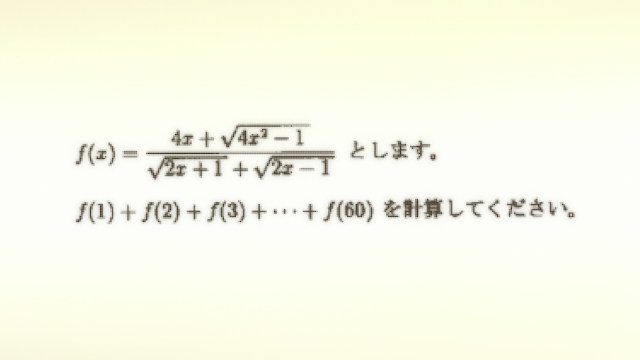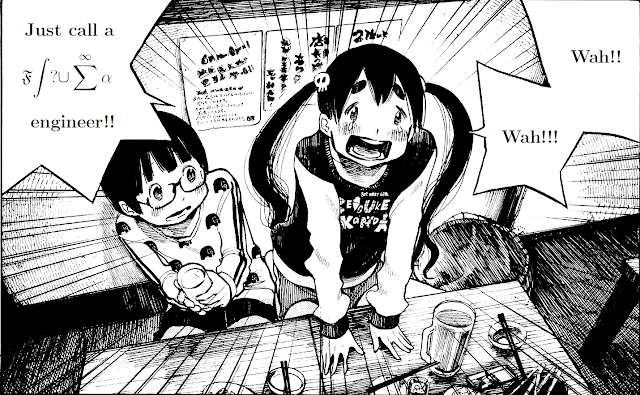Terry's Tao
You can tell I try too hard with my titles sometimes. This won't make it clear, but let me begin the post with a bit of my history with mathematics competitions. Don't worry, it'll be short since there isn't much to say.
 |
| It wasn't quite like this... |
My first experience was in middle school. I'm not sure how it works in other countries, but in mine every student used to take some special exam once a year and the ones with good scores kept progressing to next stages. I didn't really know what it was all for (other than bragging rights); I don't remember it being explained very well the state level. I did prepare for the national stage by doing problems, but I didn't do too well and that was the end of it.
For high school I went to a private French school which is disconnected from the national education system, so we never had exams like those anymore. I did get selected by the school for the concours général in math, but I didn't actually take it since it conflicted with my spring break plans (going to Europe with my then girlfriend seemed more appealing for some reason, still not sure whether to regret it or not...)
In undergrad I ended up becoming a math major with concentration in math. This of course meant I got to know about Putnam, so I decided to give it a try. I say "try", but mostly that just meant attending Putnam preparation sessions a couple of times a month with a friend and then eating awesome Chinese food. I took it 4 times, and the best I got was top 200.
The end.
The end.
 |
| ...but it did feel a bit like this. |
Now, the reason I tell you this rather random story is this:
One of my current students has quite a bit of talent for math and she finishes even "hard" exercises during class without much trouble. Because of this, I figured I would give her some more interesting problems not found in standard textbooks to keep her awake. She's found these ones more of a challenge and recently I managed to convince her to take a look at math competition questions (I say "manage" because it's very very difficult to get the average Japanese student to even glance at something that won't have an immediate effect on grades/exams...)
Right now it seems to be more for fun and entertainment than any serious attempt at preparing for a competition. Even so, since I never really trained or did particularly well in competitions, I didn't think I would be very good at giving advice. Math competitions are a very different animal compared to math research or to just undergrad/grad math after all. So, I recommended her to take a look at books/websites focused on problem solving in mathematics. She ended up finding:
Right now it seems to be more for fun and entertainment than any serious attempt at preparing for a competition. Even so, since I never really trained or did particularly well in competitions, I didn't think I would be very good at giving advice. Math competitions are a very different animal compared to math research or to just undergrad/grad math after all. So, I recommended her to take a look at books/websites focused on problem solving in mathematics. She ended up finding:
Terence Tao's "Solving Mathematical Problems" in the school's library and she started giving it a try just before summer holidays. Since the exercises are on a higher level of thinking than the ones she's been doing so far, she's not always sure if her reasoning is correct or what details she has been missing to find a solution. I've helped her when she's asked, but as a teenager born after the millennium, her actual first reaction was to look for the solutions online. Apparently though, there doesn't seem to be any! I found that hard to believe but even with my Google-fu I wasn't able to either (though I do suspect that looking for individual problems themselves probably works).
In any case, it's been forever since I looked at such problems so I got a copy of the book for myself and I thought I'd give it a try to help her better. I usually just scribble disorganized stuff in notebooks, but then it occurred to me that I could document my solutions here, so they are all easily accesible to anyone and to force me to write things coherently.
That being said, I really like the style of the book; the way Terry explains the steps he follows (and the reason he follows them) to find the solutions for his examples shine a good light on the strategies used when facing such problems.
So, rather than just posting polished solutions, I will try to honor the source (the terrible title was also an attempt at this) and describe more or less the tao I took, successful or not, to find the solution; as well as possible paths people new to problem solving might take based on the examples he provides.
This post will also be used as a hub of links to each individual problem so that they are easy to find:
In any case, it's been forever since I looked at such problems so I got a copy of the book for myself and I thought I'd give it a try to help her better. I usually just scribble disorganized stuff in notebooks, but then it occurred to me that I could document my solutions here, so they are all easily accesible to anyone and to force me to write things coherently.
That being said, I really like the style of the book; the way Terry explains the steps he follows (and the reason he follows them) to find the solutions for his examples shine a good light on the strategies used when facing such problems.
So, rather than just posting polished solutions, I will try to honor the source (the terrible title was also an attempt at this) and describe more or less the tao I took, successful or not, to find the solution; as well as possible paths people new to problem solving might take based on the examples he provides.
This post will also be used as a hub of links to each individual problem so that they are easy to find:
The Parlour Game
The Largest Hint
The Mysterious Case of the Cases
You Can (Not) Divide
The Prime Modulo
The Integer, The Rational and The Real
The Largest Hint
The Mysterious Case of the Cases
You Can (Not) Divide
The Prime Modulo
The Integer, The Rational and The Real
I'll only be able to tell how long it takes to write one solution post after I write my first one, so don't expect a fixed timeframe. What's more, since there's a good amount of problems, and knowing myself, chances are that I'll eventually give up on this project... but that's just being negative! For now at the very least, I do feel invested in this. Wish me luck!



Comments
Post a Comment